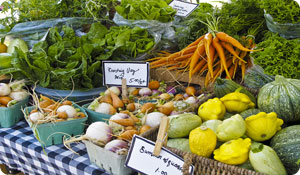
Environmentalists say that when you shop for food that is locally grown or produced, you contribute to your own health and the health of the planet. You also contribute to the economic well-being of your local community. That's what it means to be a locavore.
Why buy local? In addition to getting the freshest food possible, buying local products helps cut down on the costs and environmental impact associated with packaging, transporting, and shipping food across the country or from other countries. Plus, you're keeping local farmers, producers and purveyors in business. If you make a point to buy at least a few locally produced items every time you go food shopping, you will be supporting members of your community, state, and regional area on a regular basis.
- Stick to a 100-mile radius. There are different definitions and guidelines for what it means to be a locavore, but one common strategy is to eat food that is grown or produced within 100 miles of home. No matter where you live, that should give you a wide enough region.
- Shop at greenmarkets and farmer's markets. Depending on where you live, locally grown fruits, vegetables, whole grains, meats, eggs, and dairy products, and sometimes regional wines, honey, and maple syrup are available from local farmers and producers. You may also find a variety of locally produced food products, such as breads, pies and other baked goods, pickled foods, jams and jellies are often abundant at these same markets.
- Act like a tourist. When you travel, seeking out local food specialties is often part of the fun. Do the same at home and support folks such as local artisan bread and cheese makers.
- Select restaurants wisely. Choose ones that buy at least some of their ingredients from local growers and retailers.
- Talk to supermarket managers. Encourage store managers and buyers to stock as many local items in each department as possible.
- Be selective. Whenever there's a choice, choose local. You can't always get what you want from local farms and businesses but sometimes, local varieties of fresh foods are just as abundant as those that travel across the country (or the planet) to get to your supermarket. For instance, if you live in anywhere in New York, you're probably no more than 100 miles from an apple orchard, so there is no reason to buy apples grown in Washington State or apple juice imported from China.
Sources:
The New York City Council: Speaker Christine C. Quinn Delivers Pioneering Food Policy Speech. 22 Nov 201. Web. 2 May 2011.
http://council.nyc.gov/html/releases/11_22_10_foodworks.shtml
University of Iowa: Locavore-A New Old Way of Eating 2 May 2011.
http://www.uiowa.edu/hr/wellness/green/locavore.pdf





